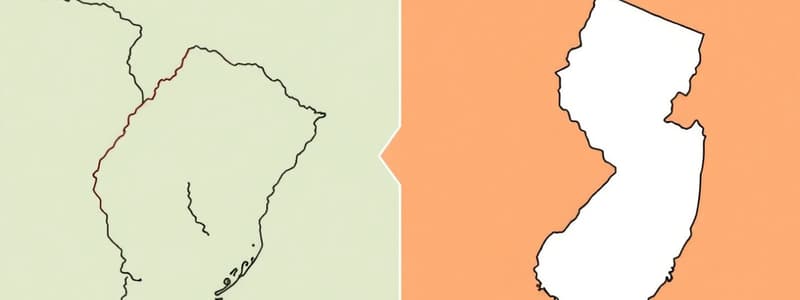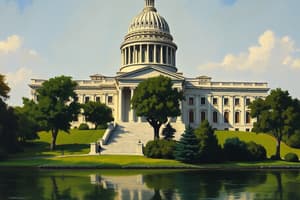Podcast
Questions and Answers
What was the main feature of the Virginia Plan regarding representation?
What was the main feature of the Virginia Plan regarding representation?
- Representation decided by state legislatures
- Representation based on population (correct)
- Representation based on land ownership
- Equal representation for all states
How were members of the upper house chosen under the Virginia Plan?
How were members of the upper house chosen under the Virginia Plan?
- Selected by voters directly
- Appointed by the president
- Elected by state legislatures
- Chosen by the lower house (correct)
Which statement accurately describes the New Jersey Plan?
Which statement accurately describes the New Jersey Plan?
- It proposed a bicameral legislature.
- It eliminated state legislature involvement in government.
- It maintained a one-house legislature with expanded powers. (correct)
- It allowed each state to have multiple votes in Congress.
What did the Great Compromise establish regarding the House of Representatives?
What did the Great Compromise establish regarding the House of Representatives?
What was a significant difference between the Virginia Plan and the New Jersey Plan?
What was a significant difference between the Virginia Plan and the New Jersey Plan?
Which of the following was a feature of the multiperson executive proposed in the New Jersey Plan?
Which of the following was a feature of the multiperson executive proposed in the New Jersey Plan?
Under the Virginia Plan, who was responsible for executing the laws?
Under the Virginia Plan, who was responsible for executing the laws?
What principle was primarily at stake in the debates over representation at the Constitutional Convention?
What principle was primarily at stake in the debates over representation at the Constitutional Convention?
Which statement about the powers of the legislature in the New Jersey Plan is correct?
Which statement about the powers of the legislature in the New Jersey Plan is correct?
What principle was articulated in the Kentucky and Virginia Resolutions?
What principle was articulated in the Kentucky and Virginia Resolutions?
Which individual wrote the Kentucky Resolutions?
Which individual wrote the Kentucky Resolutions?
What was the main reason for the Federalists' decline in popularity by 1800?
What was the main reason for the Federalists' decline in popularity by 1800?
What term describes the view that states could intervene between their citizens and federal laws?
What term describes the view that states could intervene between their citizens and federal laws?
Which faction of the Federalist party sought aggressive measures like war with France?
Which faction of the Federalist party sought aggressive measures like war with France?
What significant event took place in the election of 1800?
What significant event took place in the election of 1800?
What was Hamilton's primary intention regarding the national debt?
What was Hamilton's primary intention regarding the national debt?
What concern did southern leaders express regarding Hamilton's financial proposals?
What concern did southern leaders express regarding Hamilton's financial proposals?
How did Hamilton gain the consent of southern leaders for the assumption of state debts?
How did Hamilton gain the consent of southern leaders for the assumption of state debts?
What was the primary concern of the Antifederalists regarding the new Constitution?
What was the primary concern of the Antifederalists regarding the new Constitution?
What was the main function of the federally chartered bank created as a result of Hamilton's report?
What was the main function of the federally chartered bank created as a result of Hamilton's report?
Which state was the ninth to ratify the Constitution?
Which state was the ninth to ratify the Constitution?
What protective measure did Hamilton propose in his 'Report on Manufactures'?
What protective measure did Hamilton propose in his 'Report on Manufactures'?
Who emerged as the leader of the political opposition to Hamilton's policies?
Who emerged as the leader of the political opposition to Hamilton's policies?
What major issue did the ratified Constitution fail to address at first?
What major issue did the ratified Constitution fail to address at first?
What vision of America did Hamilton hold?
What vision of America did Hamilton hold?
Which of the following states ratified the Constitution after the government was already in operation?
Which of the following states ratified the Constitution after the government was already in operation?
What was one reason why the first Congress aimed to propose amendments to the Constitution?
What was one reason why the first Congress aimed to propose amendments to the Constitution?
What was not a proposed aspect of Hamilton's economic strategy?
What was not a proposed aspect of Hamilton's economic strategy?
In what year was George Washington inaugurated as the first president of the United States?
In what year was George Washington inaugurated as the first president of the United States?
What misconception did many original certificate owners have about their certificates?
What misconception did many original certificate owners have about their certificates?
What did the Federalists collectively support?
What did the Federalists collectively support?
How did Hamilton's policies eventually influence the formation of political factions?
How did Hamilton's policies eventually influence the formation of political factions?
What was a significant omission in the ratified Constitution concerning civil liberties?
What was a significant omission in the ratified Constitution concerning civil liberties?
Which two states ratified the Constitution shortly after New Hampshire?
Which two states ratified the Constitution shortly after New Hampshire?
Which process was used to address the omission of civil liberties in the Constitution?
Which process was used to address the omission of civil liberties in the Constitution?
What was the primary intention of the Alien Friends Act?
What was the primary intention of the Alien Friends Act?
What significant change did the Naturalization Act make regarding citizenship?
What significant change did the Naturalization Act make regarding citizenship?
How did the Sedition Act affect political dissent?
How did the Sedition Act affect political dissent?
What was the role of Republican newspaper editors during the Sedition Act enforcement?
What was the role of Republican newspaper editors during the Sedition Act enforcement?
What was the consequence faced by Matthew Lyon under the Sedition Act?
What was the consequence faced by Matthew Lyon under the Sedition Act?
Which group was particularly disadvantaged by the Naturalization Act?
Which group was particularly disadvantaged by the Naturalization Act?
What did the Alien Enemies Act allow the president to do?
What did the Alien Enemies Act allow the president to do?
How did the Federalists use the Sedition Act in 1800?
How did the Federalists use the Sedition Act in 1800?
What was the expiration date set for the Sedition Act and why?
What was the expiration date set for the Sedition Act and why?
What was a criticism Republicans had about the Alien and Sedition Acts?
What was a criticism Republicans had about the Alien and Sedition Acts?
Flashcards are hidden until you start studying
Study Notes
The Virginia and New Jersey Plans
- The Virginia Plan, proposed by James Madison, called for a bicameral legislature with representation based on state population.
- In this plan, the lower house members would be elected by voters, while upper house members would be selected by the lower house from state-nominated candidates.
- There was no provision for direct election of an executive; the president was to be chosen by the legislature and would serve a single term.
- The New Jersey Plan, offered by William Paterson, aimed to maintain a unicameral legislature while expanding its powers to raise revenue and regulate commerce.
- Each state in the New Jersey Plan received equal representation, with one vote regardless of size, and proposed a multi-person executive chosen by the legislature.
The Great Compromise
- The Great Compromise resolved representation disputes by establishing a House of Representatives based on population and a Senate with equal representation (two senators per state).
- This compromise balanced the interests of both large and small states, ensuring both proportional and equal representation.
Ratification and Debates
- The Federalists supported the new Constitution, while the Antifederalists opposed it, fearing excessive national power and the absence of a Bill of Rights.
- New Hampshire's ratification on June 21, 1788, marked the ninth state needed for the Constitution to take effect, followed by Virginia and New York.
- Rhode Island delayed ratification until May 29, 1790, after the government had already commenced operations under the Constitution.
Organizing the Government
- George Washington was inaugurated as the first president on April 30, 1789, marking the beginning of a structured federal government.
- The Constitution did not protect civil liberties explicitly nor clarify the executive branch structure, which led to ambiguity in governance.
Bill of Rights and Hamilton's Financial Policies
- The Bill of Rights emerged from the demand by five states to protect citizens from governmental abuse, leading to the creation of amendments outlining individual rights.
- Alexander Hamilton aimed to demonstrate financial viability through managing national debt, which benefited northern speculators while raising concerns in the South.
Establishment of a National Bank
- Hamilton proposed a national bank to manage federal funds, facilitate loans, and promote economic stability; it was approved and largely operated under private control.
- He supported protective tariffs to encourage American manufacturing, with a focus on benefiting domestic industries.
Political Opposition and Alien and Sedition Acts
- Thomas Jefferson emerged as the leading opposition figure against Hamilton's policies, advocating for agrarian interests versus Hamilton's vision of urban and commercial growth.
- The Alien and Sedition Acts, enacted in 1798, targeted immigrants and restricted political dissent, with measures allowing for the expulsion of dangerous aliens and criminalizing opposition to government policies.
Kentucky and Virginia Resolutions
- In response to the Alien and Sedition Acts, Jefferson and Madison drafted the Kentucky and Virginia Resolutions, asserting that states could challenge unconstitutional federal laws.
- These resolutions introduced the concepts of interposition (states protecting citizens' rights) and nullification (states canceling federal laws), which echoed later in the states' rights debates.
The Election of 1800
- Jefferson ran against John Adams in a divided Federalist party, ultimately winning due to public desire to avoid war with France and dissatisfaction with increased taxes for military expenses.
- The election marked a significant power shift, illustrating early American political divisions and the emergence of strong party lines.
Studying That Suits You
Use AI to generate personalized quizzes and flashcards to suit your learning preferences.




